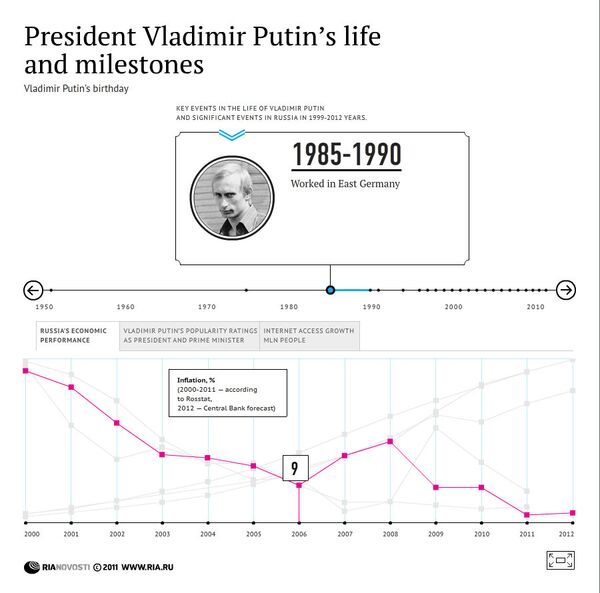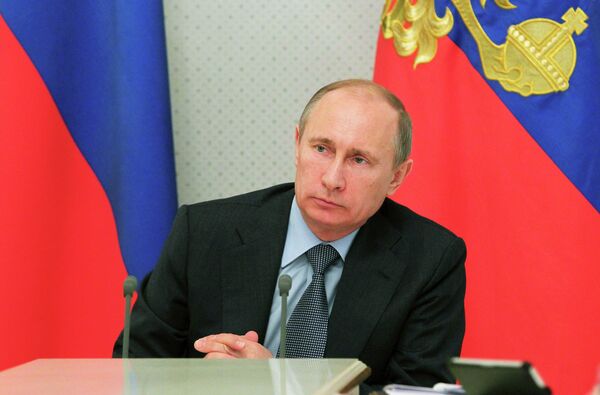MOSCOW, MAY 6 – RIA Novosti. The first year of Vladimir Putin’s third presidential term was full of events: unexpected resignations, a flood in Krymsk with an unprecedented number of victims, the first Russian APEC summit and the outstanding achievements of the Russian Olympic team. The head of state also continued a number of traditions, having resumed the practice of high-profile news conferences and question and answer sessions. RIA Novosti looks back on the most notable facts and quotations of the president’s past 12 months.
May – Inauguration and May Directives
In his first day in office, President Putin signed a number of executive orders on the long-term development of the system of public management, the army and the economic and social sphere, including education, science, healthcare, demography and utilities and also the implementation of foreign policy. These documents were based on Putin’s election program. Their implementation was declared a priority in the activities of the president and the government, which was formed in the latter half of May.
“Today we are entering a new stage in our national development and we’ll have to resolve issues of an entirely new level, quality and scale. The next few years will be decisive for Russia for decades ahead,” Putin said at his inauguration.
June – Big Time Politics: From China to Mexico
The first summer month saw the president be active on the international arena, both in the East and the West. During this time Putin visited Germany, France, Uzbekistan, Kazakhstan, Israel and Palestine. He also attended the summits of the Shanghai Cooperation Organization (SCO) in China and the G20 in Mexico City, where he met US President Barack Obama as head of state for the first time. The conversation with the American leader created hope that the idea of a “reset” was still alive and that the two powers will be able to agree on all key issues.
“I think we share opinions on many issues. We will continue our contact on a personal level, and between our experts and ministers,” Putin said at his meeting with Obama.
July – Tragedy in Krymsk
The catastrophic flooding in the Krasnodar Region – in which about 170 lives were lost – and dealing with its aftermath were the president’s priority for a long time. He visited Krymsk to hold meetings on providing aid to the victims in July and subsequent months. As Putin promised, people were able to move into new housing by the winter.
“There will be new housing. I assure you, your new homes will be much better, you’ll like them 100 percent,” Putin said at the meeting with residents of the Kuban region who lost their homes in the flooding.
August – Amulet from the Olympic Team
A fan of sports in general and judo in particular, Putin used his working visit to Britain as a good opportunity to attend the Olympic Games. Upon the completion of official talks, the Russian President and British Prime Minister David Cameron watched the semi-finals and finals in judo and witnessed the triumph of Russian fighter Tagir Khaibulayev, who won a gold medal.
“This is probably the best result in the history of Russian and Soviet sports. We haven’t achieved a result like this before,” Putin said at the meeting with judo fighters.
September – Siberian White Cranes and a Reprimand to Ministers
September was marked by many events for the president. At the beginning of the month he took part in an experiment to save a rare species of crane: the Siberian white crane. He led young birds on a delta plane, teaching them to fly away for the winter.
“Not all the cranes took to the air immediately. The weak ones remained during the first go. All of them took flight on the second go. But I must admit honestly that the leader – the pilot – was also to blame for this. He picked up speed and gained height too quickly and they simply couldn’t keep up with him,” Putin said about the experiment.
Then the president took part in the APEC Leaders’ Meeting in Vladivostok that was hosted by Russia for the first time. A major construction project was carried out prior to this event in order to host the meeting. The president expressed satisfaction with its implementation and called the expenses “absolutely justified.”
In late September, Putin reviewed the government’s implementation of presidential directives given in May. The president had to resort to tough measures on this score and made official reprimands to Labor and Social Development Minister Maxim Topilin, Education and Science Minister Dmitry Livanov and Regional Development Minister Oleg Govorun.
October – The First Resignation
On October 17, Putin forced Regional Development Minister Oleg Govorun to resign and appointed Igor Slyunyayev, the ex-governor of the Kostroma Region to the position. This was the first personnel decision during the work of Dmitry Medvedev’s government.
“The work of any minister involves personal responsibility for the performance of the industry. If something is not done, he or she must bear personal responsibility for this,” Putin said.
November – Scandal in the Defense Ministry
The second resignation took place less than a month later. On November 6, Putin dismissed Defense Minister Anatoly Serdyukov from his position against the backdrop of a scandal over large-scale embezzlement in the companies subordinate to his ministry. Serdyukov had occupied the position since 2007. Putin appointed former Emergencies Minister Sergei Shoigu, who was the governor of the Moscow Region at that time, to head the Defense Ministry, and endorsed Andrei Vorobyev, the leader of the United Russia parliamentary party, as acting governor of the Moscow Region.
Speaking about the reasons for Serdyukov’s dismissal, Putin said: “To create the necessary conditions for the objective investigation of all issues that have arisen in this context, I have made the decision to remove Defense Minister Anatoly Serdyukov from his position.”
December – Questions and Answers
In December, the president held his first news conference after a four-year break. Speaking about tense relations with the United States, which had adopted the Magnitsky Act, he admitted that he was a bad Christian and could not but respond to this unfriendly step: “I’m a bad Christian – when a man strikes me on one cheek I’m supposed to turn the other but I’m not morally ready for this.”
Reporters asked Putin to comment on the rumors that he had health problems and asked him who stands to gain from spreading them. Putin replied that the rumors benefit his political opponents who he said were trying to call into doubt the legitimacy or the competence of the authorities. “As for whether I am sick, I can give you a traditional answer: ‘Don’t hold your breath!’”
January – The Navy
December was marked by two meaningful events in the life of the marine fleet and the navy. First Putin took part in the name-giving ceremony of the head supplier ice-breaker Vitus Bering in St. Petersburg, and then he visited the base of the Northern Fleet in Severomorsk, where he presented the Nakhimov Order to the heavy nuclear-powered cruiser Pyotr Veliky. The president listened via a video link with Severodvinsk to a report by Defense Minister Shoigu on the long-awaited commissioning of the nuclear-powered missile cruiser Yuri Dolgoruky.
Speaking at the meeting on the development of the navy, Putin said: “The development of a powerful and effective navy is one of Russia’s priorities. We’ll consistently develop surface ships and submarines and strengthen the general purpose forces and the naval component of the strategic nuclear force.”
In the same month, head of Dagestan Magomedsalam Magomedov, an ethnic Dargin, suddenly resigned. Putin appointed Ramazan Abdulatipov, an ethnic Avar, who had worked in Moscow for the past 20 years, acting head of the republic.
At a meeting with him Putin said: “People should feel that they are represented in all central republican bodies of power. It is important for these people to be worthy and professional.”
February – Crazy Tariffs and Olympic “Hills”
In February, the president made a number of tough statements. He lashed out at utility workers who had jacked up prices and the builders of the Olympic projects that had delayed preparations for the Games. The recently appointed Minister of Regional Development Igor Slyunyayev had to answer for the former.
Speaking at a meeting on the housing and utilities issue, Putin said to him: “Just go and explain to the people why they have to pay in January and February so much more than in December or November! In some municipalities the utilities bills are 200 percent higher. Are they crazy or what?”

In Sochi, Putin lashed out at vice president of the Russian Olympic Committee Akhmed Bilalov. His company was building several springboards named The Russian Hills and didn’t meet the deadline or budget limitations. Later, the businessman was forced to resign.
Putin said: “Is it that the vice president of the Olympic Committee is slowing down the construction project? Well done! You are doing a really good job!”
March – Spontaneous Exercises
Spontaneous military exercises in March reflected the president’s idea that the combat training of troops should not just be for show. On the way from South Africa where Putin attended a BRICS summit, he ordered the defense minister from the plane at 4 a.m. to start exercises involving aviation, the fleet and about 7,000 personnel.
Speaking at a meeting of the Defense Ministry’s board Putin said: “The program of combat training should not just be for show, when rank-and-file personnel know about a training alert half a year in advance. It should be as close to real conditions as possible. It should be as close as possible to modern combat and the modern conditions of armed warfare.”
April – Question and Answer Session
The most important event in April was the president’s first question and answer session during this presidential term. It lasted a record four hours and 47 minutes. In addition to many questions on the economy, foreign and social policy, corruption and security, Putin answered several philosophical and rhetorical questions. One of them – “Who lives a nice life in Russia” – was rephrased into “When will life be good in Russia?”
Putin said jokingly “People who drink say that it is impossible to drink all the vodka, but one should strive for this. Likewise, life is never going to be perfect, but we’ll strive for this.”

